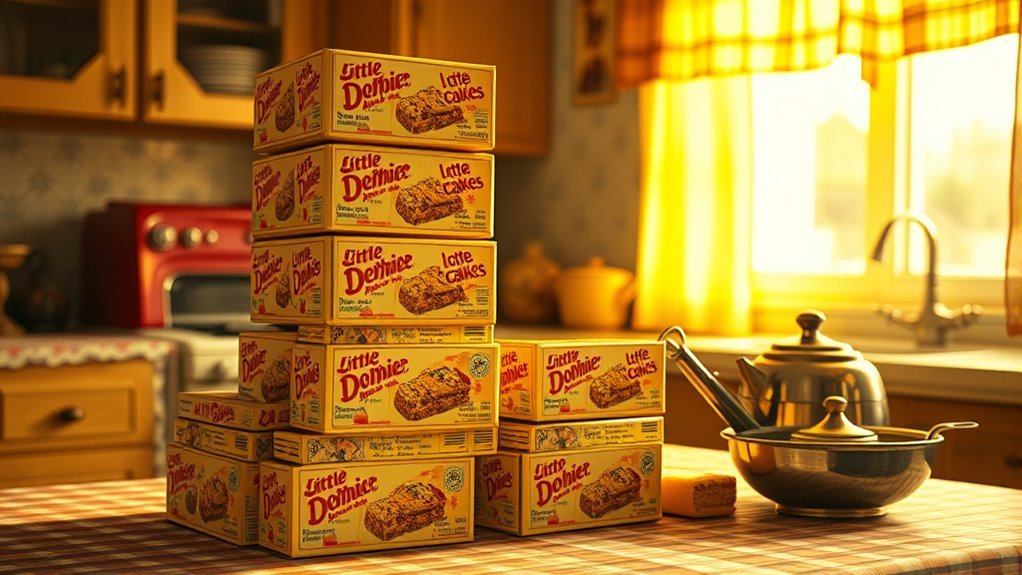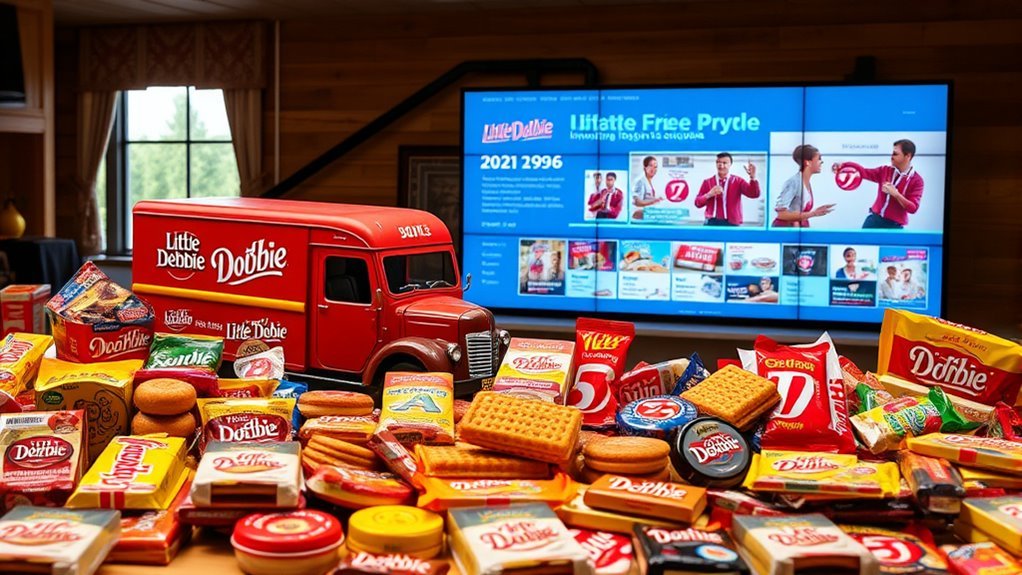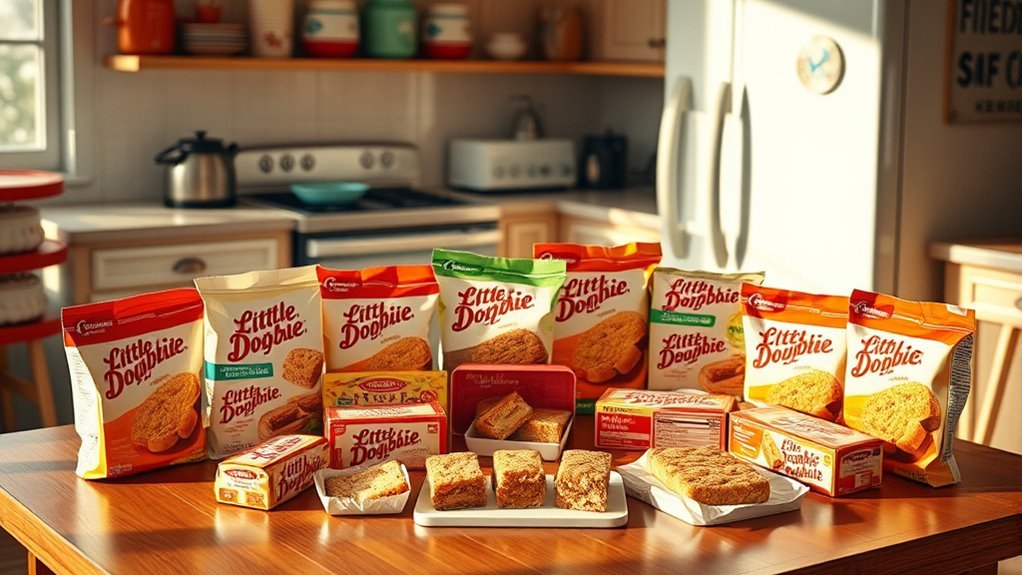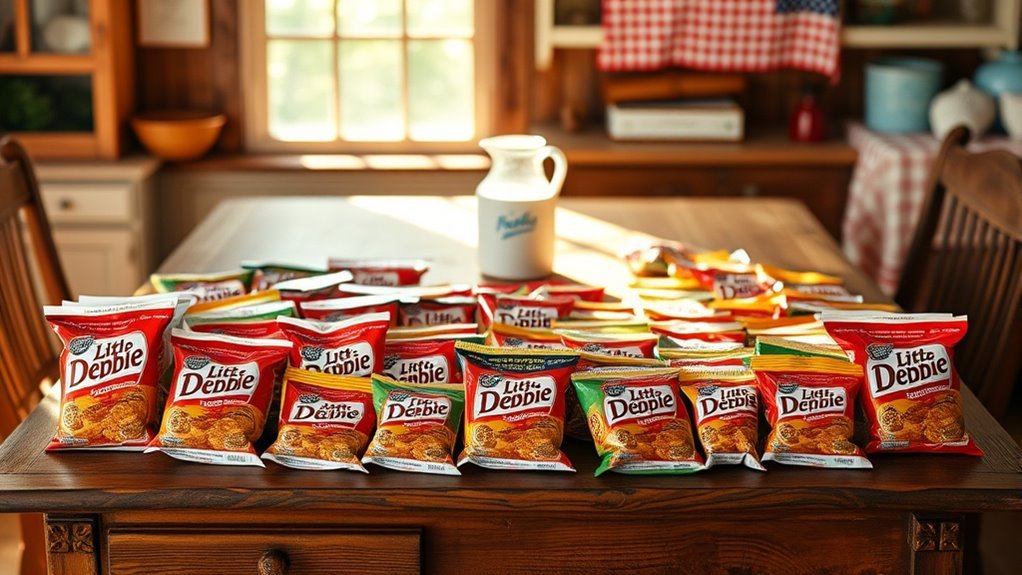Have you ever wondered how Little Debbie snack cakes became a household name? You might be surprised to learn it all started with a couple selling cakes from their car in Tennessee back in 1934. Fast forward to today, Little Debbie’s lineup includes classics like Swiss Rolls and seasonal favorites. How did a family-run business evolve into an iconic brand? There’s more to discover about the ingenuity and legacy behind these beloved treats.
Key Takeaways
- Little Debbie was founded in 1934 by O.D. and Ruth McKee in Tennessee.
- The brand’s first snack, Oatmeal Creme Pies, launched in 1935 for five cents each.
- “Little Debbie” was named after Debbie McKee-Fowler, introduced as a brand in 1960.
- Swiss Rolls and Christmas Tree Cakes are notable product innovations from 1963 and 1985, respectively.
- Little Debbie family packs, introduced in 1960, revolutionized snack cake marketing.
The Origins of Little Debbie Snack Cakes

Although the Great Depression was a challenging time for many businesses, it marked the beginning of Little Debbie snack cakes. Founded in 1934 by O.D. and Ruth McKee in Collegedale, Tennessee, McKee Foods started by selling cakes door-to-door from a 1928 Whippet.
The first product, Oatmeal Creme Pies, debuted in 1935 at just five cents each, providing an affordable treat during tough economic times.
In 1960, the brand name “Little Debbie” was introduced, inspired by O.D. McKee’s granddaughter, Debbie McKee-Fowler. Her image, crafted by artist Pearl Mann, became the face of the brand.
The innovative family packs were launched the same year, propelling the popularity of these snack cakes and firmly establishing Little Debbie’s presence in American households.
Evolution of Product Offerings
As you explore the evolution of Little Debbie‘s product offerings, you’ll notice how the brand has continually innovated its snack cakes and introduced seasonal favorites.
From the classic Oatmeal Creme Pies to the festive Christmas Tree Cakes, each product reflects a strategic response to market trends and consumer preferences.
With additions like Cosmic Brownies and Birthday Cakes, Little Debbie has guaranteed there’s always something to celebrate.
Snack Cake Innovations
Snack cake innovations have been at the heart of Little Debbie’s evolution, consistently bringing delight to consumers across generations.
It all started with Oatmeal Creme Pies in 1935, a humble beginning that set the stage for future successes. McKee Foods, the brand’s parent company, revolutionized snack cake marketing in 1960 by introducing family packs, selling over 14 million cakes in just 10 months.
Swiss Rolls, inspired by European trends, debuted in 1963 and quickly became favorites. Seasonal products like Christmas Tree Cakes, introduced in 1985, became holiday staples.
Little Debbie continued to innovate with the launch of Cosmic Brownies in 1999, showcasing a commitment to product evolution and adapting to consumer preferences while maintaining a legacy of delicious treats.
Seasonal Product Launches
Over the years, Little Debbie has captivated consumers with its tradition of seasonal product launches, adding a delightful twist to its classic offerings. The introduction of Christmas Tree Cakes in 1985 marked the beginning of an iconic holiday treat that has since become synonymous with festive cheer.
Catering to consumer preferences, Little Debbie expanded its holiday treats with Christmas Tree Brownies in 1999, ensuring its lineup remained relevant during the festive season. With seasonal flavors like Pumpkin Spice Rolls, the brand adapts to trends, creating limited-time offerings that excite.
Unique recipes, such as Homemade Little Debbie Christmas Tree Cakes, invite consumer creativity. These seasonal snacks, including Mini Christmas Tree Cake Donuts, showcase Little Debbie’s commitment to evolving its iconic snacks.
Key Marketing Strategies and Innovations

You’ll notice Little Debbie’s knack for capturing attention through innovative packaging techniques, like their pioneering family packs that transformed snack cake marketing in 1960.
Their effective brand collaborations, such as partnering with NASCAR, further amplified their presence and engaged a diverse audience.
Innovative Packaging Techniques
When it comes to innovative packaging techniques, Little Debbie has consistently set the standard in the snack industry.
You’ll appreciate how they’ve transformed branding with their iconic family packs. By 1960, these packs, each containing 12 individually wrapped snack cakes, became a game-changer, promoting a recognizable product identity.
Little Debbie’s marketing strategies didn’t stop there. In 1962, they introduced full-color cartons that enhanced the visual appeal of their snacks on shelves. This move, coupled with the 1964 introduction of the Bow Tie logo, solidified their brand identity.
Key highlights include:
- Family packs: Revolutionized snack cake marketing.
- Full-color cartons: Boosted visual appeal and brand recognition.
- Bow Tie logo: Strengthened their branding aesthetics.
Little Debbie’s packaging innovations effectively helped them dominate the market.
Effective Brand Collaborations
Although Little Debbie has long been known for its innovative packaging, their effective brand collaborations have also played a significant role in their marketing success.
By introducing the family pack in 1960, Little Debbie revolutionized snack cake sales. Their NASCAR partnership in 2006 further propelled their visibility, aligning with a broad audience and boosting brand recognition.
Seasonal products like the iconic Christmas Tree Cakes, heavily marketed during the holidays, drive sales and foster brand loyalty. Engaging promotional activities, such as launching Cosmic Cupcakes into space, showcase their creativity.
Collaborations with charitable events, like the Share-A-Thon Cupcake Car tour, strengthen community ties and enhance their brand image. These strategies underscore Little Debbie’s dedication to effective marketing and innovation.
The Role of Family in Brand Development
Family has always been at the heart of Little Debbie’s brand development. You can see the family‘s influence in every aspect of McKee Foods. The brand was named after Debbie McKee-Fowler, O.D. McKee’s granddaughter, who now serves as executive vice president, continues the family legacy.
Ruth McKee’s operational role was essential in the early years, managing office tasks and ensuring high-quality ingredients, which was groundbreaking for women at the time. The McKee family’s commitment to community involvement underscores their dedication to their consumers and employees.
This family involvement is reflected in their strategic brand development and unwavering community commitment, making Little Debbie a beloved American staple.
Impact on American Snack Culture

Little Debbie’s impact on American snack culture is undeniable, with its products accounting for about one-third of all snack cake sales in the U.S.
Thanks to McKee Foods’ savvy marketing strategies, Little Debbie snacks have become a household staple. The introduction of family packs in 1960 revolutionized convenience, selling over 14 million cakes within 10 months. Their affordable pricing, often half that of competitors, makes Little Debbie accessible to a wide demographic.
Iconic treats like Christmas Tree Cakes, introduced in 1985, evoke nostalgia and have become a beloved holiday tradition.
Strategic partnerships, such as being the Official Snack Cake of the 1982 World’s Fair, further cemented Little Debbie’s status in American snack culture, creating lasting memories for families.
Company Values and Business Practices
Beyond its significant influence on American snack culture, the ethos driving Little Debbie‘s operations reflects a deep-seated commitment to community and ethical business practices.
At McKee Foods, the company values are deeply intertwined with Seventh Day Adventist beliefs, ensuring operations align with these principles. This includes closing from sunset Friday to sunset Saturday.
They focus on employee retention by fostering a positive work environment, offering fair wages, and promoting long-term satisfaction.
Little Debbie’s business practices extend to risk-taking and resilience, encouraging employees to overcome challenges. Charitable events benefiting children are central, but avoid the Sabbath, ensuring alignment with their values.
Consumer satisfaction remains paramount, reflecting a sincere dedication to treating everyone with respect and dignity.
- Fair wages and a positive work environment
- Commitment to consumer satisfaction
- Alignment with Seventh Day Adventist beliefs
Little Debbie’s Cultural Significance
Rooted in Southern culture, Little Debbie snacks have woven themselves into the fabric of American traditions, offering comfort and nostalgia to families across generations.
Little Debbie products represent a cultural significance that extends beyond simple treats. Their Christmas Tree Cakes, launched in 1985, have become a beloved symbol of holiday celebrations. Known for accessible indulgence, these snacks capture the essence of Southern culture and hold a commanding presence in the snack cake industry, accounting for about one-third of all sales.
The brand’s history showcases resilience and innovation, surviving the Great Depression’s economic challenges.
Little Debbie products have consistently provided affordable joy, making them a staple in Southern food traditions. They embody a blend of comfort and nostalgia, cherished during both ordinary days and festive occasions.
Conclusion
You’ve seen how Little Debbie’s journey began with humble car sales and grew into a beloved snack icon. Their diverse and innovative product lineup, like Swiss Rolls and Christmas Tree Cakes, showcases a commitment to delighting taste buds. Family values have guided their brand development while smart marketing has cemented their place in American snack culture. Little Debbie’s commitment to quality and tradition guarantees they remain a cherished part of your snack time memories and cultural landscape.
FAQs
1. Does the McKee Family Still Own Little Debbie?
Yes, the McKee family still owns Little Debbie. You can see their influence in the company’s values and community efforts. They’ve managed to keep the brand privately held, ensuring it remains true to its original vision.
2. Is Little Debbie Based on a Real Person?
Yes, Little Debbie is based on a real person. You’re looking at Debbie McKee-Fowler, the granddaughter of O.D. McKee. She’s not just the brand’s face but also actively involved in McKee Foods’ operations today.
3. What Was the First Little Debbie Ever Made?
You’re wondering about the first Little Debbie treat? It was the Oatmeal Creme Pie. This classic snack, with its delicious creamy filling between two soft oatmeal cookies, started it all and remains a favorite today.
4. Why Did Little Debbie Stop Selling to the Military?
You’re curious about why Little Debbie stopped selling to the military. They didn’t renew contracts, likely due to changes in procurement policies and a shift towards healthier snacks. The company hasn’t disclosed specific reasons, fueling speculation.

